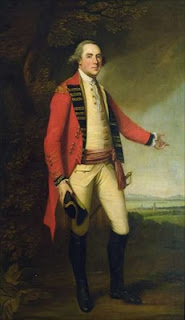“This afternoon General Gage arriv’d from New York”
The Boston Whigs’ dispatch for 15 Oct 1768 reported that the British army’s hunt for deserters had achieved results:
But the big news 250 years ago today was that Gen. Thomas Gage had arrived from New York to see how the soldiers under his command were settling in. The Boston Whigs were actually glad to see him, or at least said they were:
Deacon John Tudor wrote about the day:
Merchant and selectman John Rowe had his own take:
Rowe’s diary entry for the next day says:
A deserter from the 14th Regiment was brought in the last evening by one of the decoy parties, sent into the country, also a labouring man from Roxbury, with a soldier’s regimentals on his back, he was confined for some time in a tent, without lawful warrant, and afterwards committed to prison by Mr. Justice [Foster] Hutchinson,—Imagine the tyranny of the army confining a local farmworker for doing something as unsuspicious as wearing a soldier’s uniform!
But the big news 250 years ago today was that Gen. Thomas Gage had arrived from New York to see how the soldiers under his command were settling in. The Boston Whigs were actually glad to see him, or at least said they were:
This afternoon the troops were drawn up, on the Common, on the appearance of General Gage; at sunset there was 17 discharges from the field cannon; he passed the front of the battalion in his charriot, preceded by a number of aid de camps on horseback.—The arrival of this gentleman from N. York at this time, is a very agreeable circumstance, to the friends of their country; as his mild and judicious behaviour in that province, has been justly applauded; and he comes here determined to see and judge for himself.Some New Yorkers would have disputed that judgment, though the biggest conflicts between soldiers and civilians there were still to come.
Deacon John Tudor wrote about the day:
This afternoon General Gage arriv’d from New York just before sunset when the Troops where drawn up in the common to receive him & his Retennu, 17 discharges from the field cannon was fir’d to honour him, who came in his Chariot & 4, his Aid de camps on Horseback, all together with the Regiments made a gallant Show; Many disputes arose between the Governor Council, Justices & Selectmen aboute Quartering & Biliting the Troops.Local elected officials were still pushing for the troops to be moved out to Castle William.
Merchant and selectman John Rowe had his own take:
General Gage arr’d from New York at Major [Robert] Byards at Roxbury. The regiments were under arms & made a Good Appearance. The General with his attendants came into Town abo. four P.M. The Artillery saluted with 17 Guns. They passed & marched along the Front of both Regiments & Capt. [John] Wilsons two Companies who were formed in the Center.Robert Bayard, who appears to have hosted Gen. Gage the night before he came into Boston, was from a New York mercantile family. He had been a captain in the Royal American Regiment during the French & Indian War under Gen. James Wolfe. Bayard married Rebecca Apthorp, the youngest surviving daughter of Charles and Grizzell Apthorp, who had been Boston’s wealthiest couple. The Bayards had a daughter baptized in Boston in 1768, but Rebecca died four years later. Robert Bayard appears to have then returned to New York and married Elizabeth McEvers, who was both the widow of a partner in his family firm and another Apthorp daughter, thus his sister-in-law. The Bayards moved to Britain during the war, their New York properties confiscated. Elizabeth died in 1800, Robert in 1819, said to be the last British officer surviving from the Battle of Québec. But I digress.
Rowe’s diary entry for the next day says:
This morning I waited on Colo. [James] Robertson who came with Gen. Gage. He received me very Politely. I had a full hour’s discourse with him abo. the troops. I find him to be a Gentleman of Great Abilities & very cool & dispassionate. I took a walk & met Gen. Gage & Colo. [William] Dalrymple. Gen. Gage engaged me to wait on him tomorrow morning.Robertson was deputy quartermaster general for the army in North America, the man in charge of ensuring the troops were housed and fed. Rowe was one of the Boston selectmen disputing about where those troops should live. But he was already renting space to army officers, pleased to meet with Robertson, and, as his diary reveals, eager to socialize with Gen. Gage.


No comments:
Post a Comment